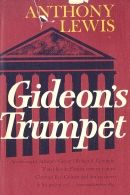One of the great journalists of his era, and the man who revolutionized reporting about the Supreme Court, Anthony Lewis, died today from renal and heart failure. Lewis was 85.
Lewis reported on the Supreme Court for the New York Times first as correspondent and then later as a columnist. He later headed the Times bureau in London and wrote extensively on foreign policy issues.
http://www.nytimes.com/2013/03…
Perhaps best known for his stirring 1964 account of the Supreme Court case Gideon v. Wainwright, which established the right to counsel for poor defendants, Gideon’s Trumpet, Lewis also won two Pulitzer Prizes, the first when he worked for the Washington Daily News for his series on the unjust denial of a security clearance to a Navy employee, and the second in 1963 for his reporting on the Supreme Court at the Times. The citation for the second Pulitzer cited his work reporting on Baker v. Carr, a major redistricting case which helped to establish the principle of one man, one vote. Curiously, in their decision in Baker, the Court itself cited a law review article on redistricting written by Anthony Lewis.
Lewis, in later years, wrote extensively on foreign policy. Whether it was with regard to the law or foreign policy, Lewis always wrote in a lucid, easy-to-understand manner — one which explained without talking down to the reader.
Crossposted at the Daily Kos

5 comments